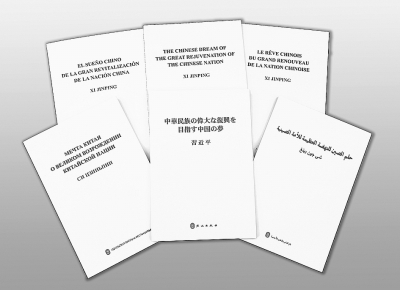Xi's speeches on Chinese Dream published in various languages

On July 18, a symposium announcing the publishing of The Selection of Xi Jinping's Statements on the Chinese Dream of Rejuvenation (referred as the Selection thereafter) took place at the Central Compilation and Translation Bureau (CCTB) in Beijing. Attendees also discussed the translation work in the new international context.
The Selection was translated into various foreign languages, including English, French, Russian and Japanese, by CCTB and published by Foreign Languages Press recently. Attendees to the symposium noted that this marks the first systematic translation and introduction of Xi's political thought in foreign languages, which expected to help the international community gain a better understanding of the background, connotation and significance of the Chinese Dream as well as the CPC's political philosophy and contemporary Chinese values.
In order to cater to the needs of international readers and make the editions easy to understand, translators of the Selection have tailored the content to the different features of each target language in an endeavor to provide a complete rendering of Xi's important statements on the Chinese Dream while maintaining his original humorous and vivid style.
"Using the publication of the Selection as an opportunity, we need to innovate the narrative way and the approach of disseminating information so that to broaden the channels to interact with international audience." Attendees said.
Explaining the Chinese Dream, it’s better to go along with introducing the Chinese path and the Chinese spirit together. President Xi Jinping's speeches and statements since convening of the 18th CPC National Congress have covered all aspects of the Party and state work. Demonstrating the collective political philosophy of the new leadership, these speeches have received extensive attention from the international community. Attendees emphasized it's a great timing to introduce and interpret major strategic thoughts and policy decisions of Chinese new leadership, facilitating favorable international public environment for China’s development.
Attendees suggested formulating an interpretative framework through concluding successful experiences from China's practice so that to tell the Chinese story well and make China's voice heard. At the same time, they said, it is necessary to consider the mindset of the international audience and adopt a way widely accepted in the world.
Participants to the symposium included Wang Xiaohui, deputy director of the Publicity Department of CPC and the Central Policy Research Center; Jia Gaojian, director of CCTB, and Li Peilin, vice-president of the Chinese Academy of Social Sciences.
The Chinese version appeared in Chinese Social Sciences Today, No. 623, July 21, 2014
Translated by Jiang Hong
